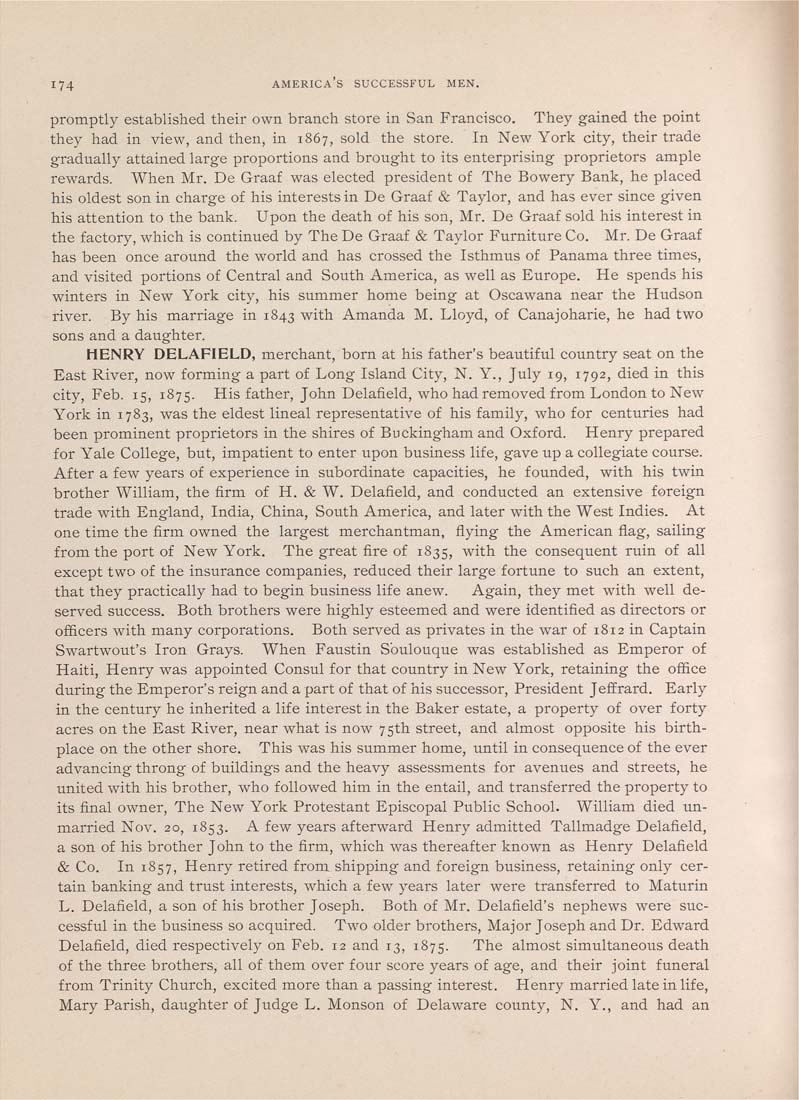174
AMERICA S SUCCESSFUL MEN.
promptly established their own branch store in San Francisco. They gained the point
they had in view, and then, in 1867, sold the store. In New York city, their trade
gradually attained large proportions and brought to its enterprising proprietors ample
rewards. When Mr. De Graaf was elected president of The Bowery Bank, he placed
his oldest son in charge of his interests in De Graaf & Taylor, and has ever since given
his attention to the bank. Upon the death of his son, Mr. De Graaf sold his interest in
the factory, which is continued by The De Graaf & Taylor Furniture Co. Mr. De Graaf
has been once around the world and has crossed the Isthmus of Panama three times,
and visited portions of Central and South America, as well as Europe. He spends his
winters in New York city, his summer home being at Oscawana near the Hudson
river. By his marriage in 1843 with Amanda M. Lloyd, of Canajoharie, he had two
sons and a daughter.
HENRY DELAFIELD, merchant, born at his father's beautiful country seat on the
East River, now forming a part of Long Island City, N. Y., July 19, 1792, died in this
city, Feb. 15, 1875. His father, John Delafield, who had removed from London to New
York in 1783, was the eldest lineal representative of his family, who for centuries had
been prominent proprietors in the shires of Buckingham and Oxford. Henry prepared
for Yale College, but, impatient to enter upon business life, gave up a collegiate course.
After a few years of experience in subordinate capacities, he founded, with his twin
brother William, the firm of H. & W. Delafield, and conducted an extensive foreign
trade with England, India, China, South America, and later with the West Indies. At
one time the firm owned the largest merchantman, flying the American flag, sailing
from the port of New York. The great flre of 1835, with the consequent ruin of all
except two of the insurance companies, reduced their large fortune to such an extent,
that they practically had to begin business life anew. Again, they met with well de¬
served success. Both brothers were highly esteemed and were identifled as directors or
officers with many corporations. Both served as privates in the war of 1812 in Captain
Swartwout's Iron Grays. When Faustin Sbulouque was established as Emperor of
Haiti, Henry was appointed Consul for that country in New York, retaining the office
during the Emperor's reign and a part of that of his successor. President Jeffrard. Early
in the century he inherited a life interest in the Baker estate, a property of over forty
acres on the East River, near what is now 75th street, and almost opposite his birth¬
place on the other shore. This was his summer home, until in consequence of the ever
advancing throng of buildings and the heavy assessments for avenues and streets, he
united with his brother, who followed him in the entail, and transferred the property to
its final owner. The New York Protestant Episcopal Public School. William died un¬
married Nov. 20, 1853. A few years afterward Henry admitted Tallmadge Delafield,
a son of his brother John to the firm, which was thereafter known as Henry Delafield
& Co. In 1857, Henry retired from shipping and foreign business, retaining only cer¬
tain banking and trust interests, which a few years later were transferred to Maturin
L. Delafield, a son of his brother Joseph. Both of Mr. Delafield's nephews were suc¬
cessful in the business so acquired. Two older brothers. Major Joseph and Dr. Edward
Delafield, died respectively on Feb. 12 and 13, 1875. The almost simultaneous death
of the three brothers, all of them over four score years of age, and their joint funeral
from Trinity Church, excited more than a passing interest. Henry married late in life,
Mary Parish, daughter of Judge L. Monson of Delaware county, N. Y., and had an
|








